Why anti-lockdown protests are a 'magnet' for white supremacists and far-right extremists
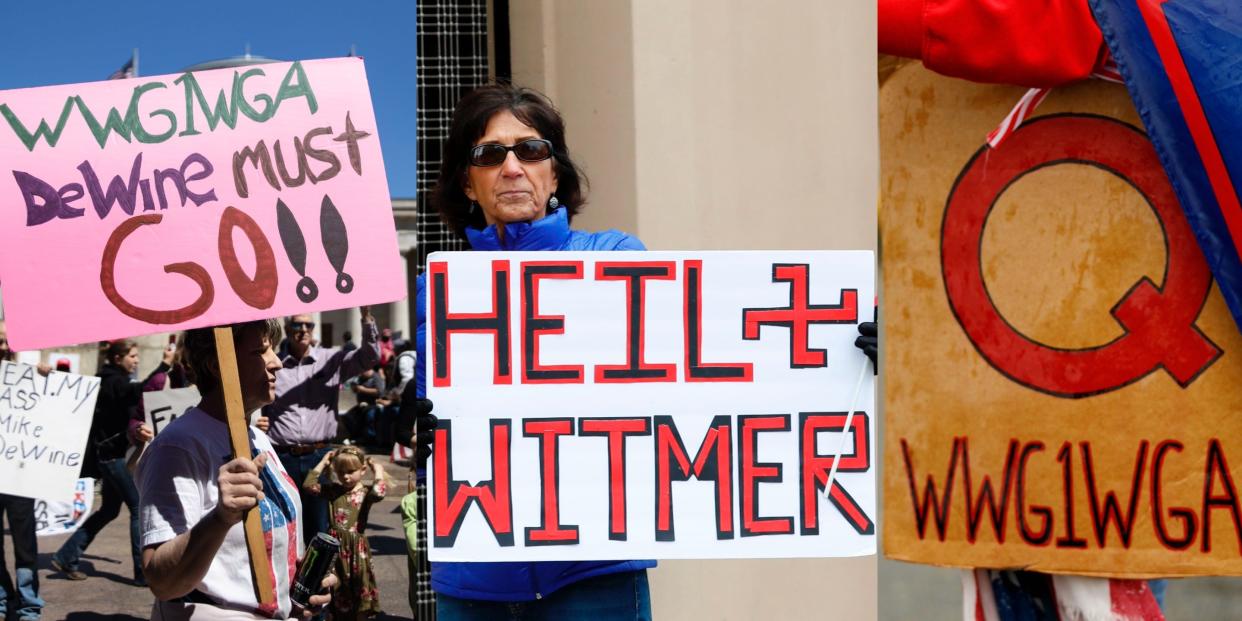
Megan Jelnger, Kowalsky, John Rudoff/ Getty Images
Protests over state-mandated social distancing and business closures weren't started by extremist groups — but white supremacists and those with similar ideologies have seized upon them across the US.
According to experts who study extremist groups, anti-lockdown demonstrations fit perfectly into the ideology of white supremacists and other far-right groups, such as sovereignty, rejecting the legitimacy of government, and anti-immigration sentiment.
"The anti-lockdown protests are a magnet because they represent so many different things that dovetail so nicely with the pre-existing trends of right-wing and white supremacist extremism," Dr. Peter Simi told Business Insider.
One protest organizer, Michigan United for Liberty, told Business Insider it did not "agree with violent or hateful remarks or threatening rhetoric" expressed at rallies while noting that they "cannot control what people bring, do, or say."
At the beginning of May, states across the country began to relax stay-at-home orders that closed non-essential businesses and ordered residents to practice social distancing. But while the majority of Americans supported the continuation of social distancing measures meant to prevent spikes in coronavirus cases that would overwhelm local medical systems, including lockdown and stay-at-home orders, state leaders across the country faced mounting pressure from protesters to reopen — even if doing so didn't coincide with the advice of health experts.
Texas, which saw anti-lockdown protests at its state capitol throughout April, began to relax its stay-at-home at the beginning of May, and since then, infections have spiked as nail salons, restaurants, movie theaters, and even gyms reopened to the public. On Saturday, state officials reported 1,801 new cases of COVID-19 — the highest the state had so far seen in a single day.
Republican Gov. Greg Abbott attributed the increase in testing in the state — particularly in hardest-hit areas like meatpacking plants — and continued to push ahead with Texas' plan to reopen. As of Wednesday, all 50 states have at least partially reopened.
Far-right groups, including some with white supremacist ties, have flocked to these protests around the US arguing against the state orders meant to curb the spread of COVID-19.
In April, protesters Michigan carried signs that compared Gov. Gretchen Whitmer, a Democrat, to Hitler, flashed Trump 2020 signs, and even waved Confederate flags — a symbol of modern-day white supremacists. Some of the protesters were armed. On April 30, armed protesters marched into the state capitol while the legislature was meeting.
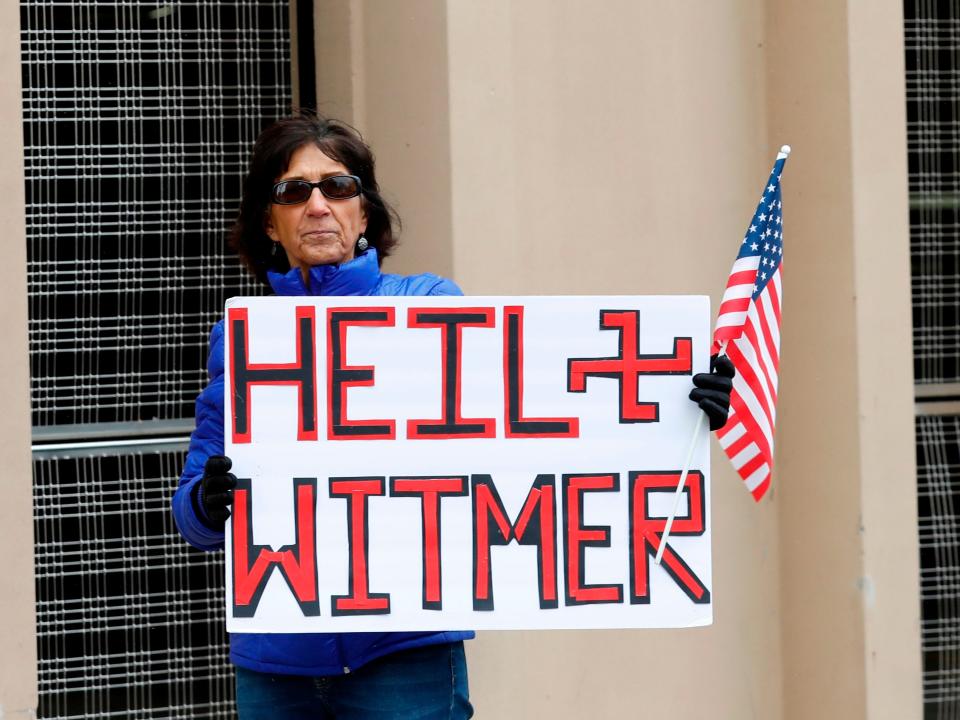
JEFF KOWALSKY/AFP via Getty Images
"The majority of the protesters were white," Michigan State Rep. Sarah Anthony Anthony told Michigan newspaper City Pulse. "I'm still not exactly sure about the connection between confederate flags and Nazi symbolism. They just had no connection to the stay-at-home orders. The fact they were carrying guns openly while we voted was unnerving."
Michigan United for Liberty, which has organized protests in the sate, told Business Insider it did not "agree with violent or hateful remarks or threatening rhetoric" and believed the "majority of our members would agree with us on this matter."
"While we respect everyone's constitutional rights to bear arms and we know Michigan is an open carry state, we do ask those who wish to carry to do so in a respectful and lawful manner," a spokesperson for the organization said. "We cannot control what people bring, do, or say, but we have made several statements in regards to keeping our events peaceful."
On May 1, a woman at a "Re-Open Illinois" demonstration held a sign that read, "Arbeit Macht Frei, JB," targeting Illinois Gov. J.B. Pritzker, who is of Jewish descent.
The phrase, which is German and means "work sets you free," is famous for being placed above the gates of Auschwitz — the largest Nazi extermination camp during the Holocaust, as Business Insider previously reported. A group that has organized protests to reopen Illinois did not immediately return a request for comment.
As the Washington Post noted on May 1, protests across the US, which have been backed by "conservative megadonors," have had ties to a range of unlikely causes: the anti-vaccination movement, the Proud Boys, anti-government conspiracy theorists called QAnon, and a group that advocates for a second civil war called the Boogaloo Boys.
Anti-lockdown protests are a "magnet" for white supremacist and far-right agenda, according to experts
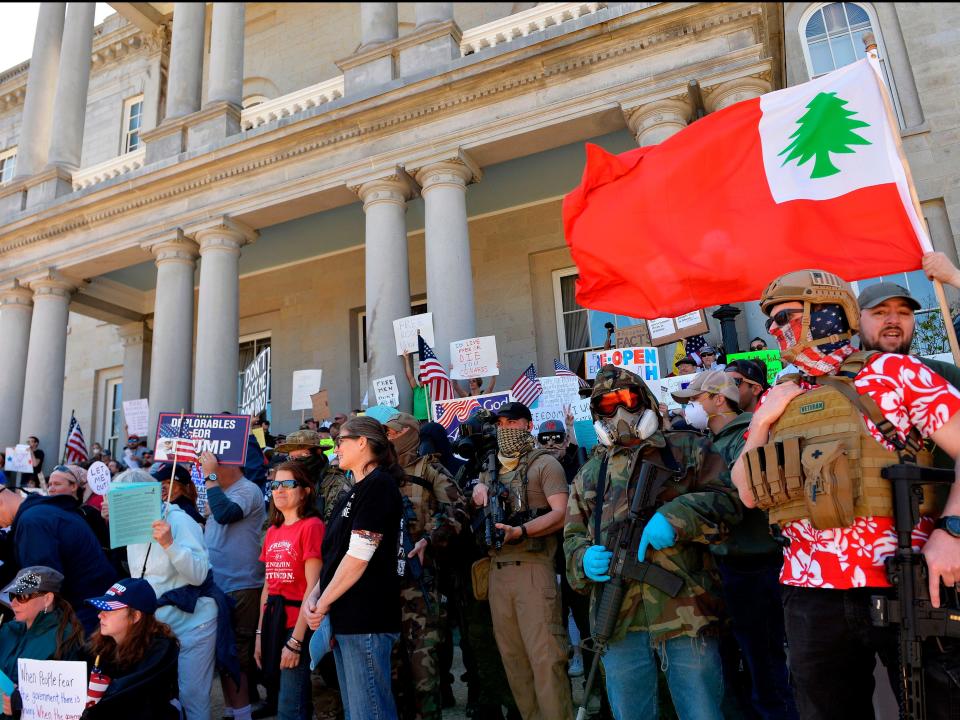
JOSEPH PREZIOSO/AFP via Getty Images
Dr. Peter Simi, a professor of sociology at Chapman University who studies political extremist groups, told Business Insider that joining these protests is a logical step for extremists, even if their concerns about the economy play a backseat to their true intentions.
"They're looking for ways to latch on to any kind of mainstream elements that can help further their narratives about racism, xenophobia, and immigration," Simi said.
"COVID-19 and the crisis surrounding it is custom-built for far-right extremist ideology and white supremacist ideology in particular," he continued. "The anti-lockdown protests are a magnet because they represent so many different things that dovetail so nicely with the pre-existing trends of right-wing and white supremacist extremism."
Simi said white supremacists and members of far-right organizations typically find the government to be "intrusive" and depriving them of liberty and their sovereignty.
"These are long tropes within right-wing extremists that have been around for a long long time," he said. Thus state leaders' decisions to close non-essential businesses and order residents to stay at home laid bare an opportunity for these groups to "further their narrative about excessive government, about government overreach, and about the government being completely corrupt and illegitimate," Simi said.
Cassie Miller, a senior research analyst at the Southern Poverty Law Center who conducts research on radical groups, also said far-right extremists and those with white supremacist ideology have found a home with these lockdown protests.
"It's not the first time," she said of radical groups latching on to more mainstream news and causes. "When there are uprisings of political frustration on the right it's something that extremists are always paying attention to and trying to harness their own ends."
Miller said white supremacists and far-right groups similarly co-opted movements related to the Tea Party around the time of the 2008 economic recession and more recently after the 2015 shooting at a church in Charleston, South Carolina that left nine Black churchgoers dead.
"Riots broke out all over the country where people were arguing that the confederate flag should stay up at statehouses and other public places," Miller said. "There were hundreds of these rallies, and the extremists were there on the ground with them because they felt these were people who were kind of primed to accept their perspective."
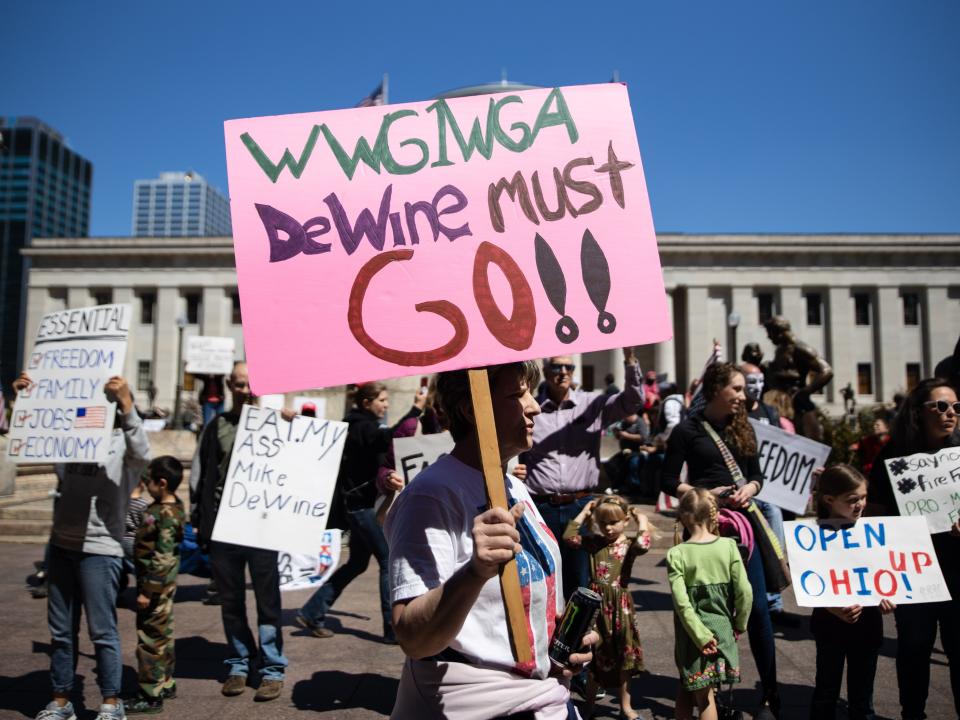
MEGAN JELINGER/AFP via Getty Images
She added: "I think this is a similar thing — they're seeing this outbreak of frustration and they want to harness it for their own ends."
And there is cause for frustration — more than 36 million people have applied for unemployment benefits over the past eight weeks — an all-time high. And those who can work amid the ongoing pandemic are fearful they're risking their health.
"I'm sure there are some [protesters] who sincerely fear for their livelihood and are essentially mobilizing to open up the economy," Simi told Business Insider. "As far as the extremists — that element is really the side issue," he argued.
"Their concern is really much more about mobilization, getting their message out, expanding their narrative, and using crisis situations to spread fear and to spread anxiety."
Miller pointed toward the Boogaloo Boys — known both for their Hawaiian shirts and belief of an impending civil war known as the Boogaloo — who have appeared at anti-stay-at-home protests. While not all of those who believe in the Boogaloo identify as white supremacists, some "conceive of the boogaloo as a race war or a white revolution," according to the Anti-Defamation League.
According to the Associated Press, armed demonstrators in April passed out fliers that read "Liberty or Boogaloo" at an anti-lockdown protest at the New Hampshire State House. A leader of the Three Percenters militia movement at a Washington state protest encouraged protesters to wear Hawaiian shirts, the group's de facto uniform.
On May 9, police in a Raleigh, North Carolina investigated a confrontation between a couple and an armed protester at a rally that had been publicized on Facebook by a group called "Blue Igloo" — a derivation of "Boogaloo," according to the report.
White supremacists and other radicals feel emboldened by local and national leadership
Simi said rhetoric from the top has further emboldened white nationalists looking to foster negative sentiment toward non-white people and immigrants.
President Trump and Republicans have blamed the spread of the virus, which is believed to have originated in the Chinese city of Wuhan toward the end of 2019, on the Chinese government — often calling the virus the "Chinese virus" even though that moniker is largely considered racist.
"The idea is that viruses are somehow connected to immigrants and foreigners," Simi said. "That becomes a key element for them to try to latch on to. When you have the president and other political leaders kind of espousing these ideas it makes it that much easier to spread their rhetoric as well."
In April, amid ongoing protests over lockdown measures, the president in a tweet called to " LIBERATE" states — Virginia, Michigan, and Minnesota. In May, Trump tweeted that the armed protesters in Michigan were "very good people" and urged the state's governor to "make a deal" with them.
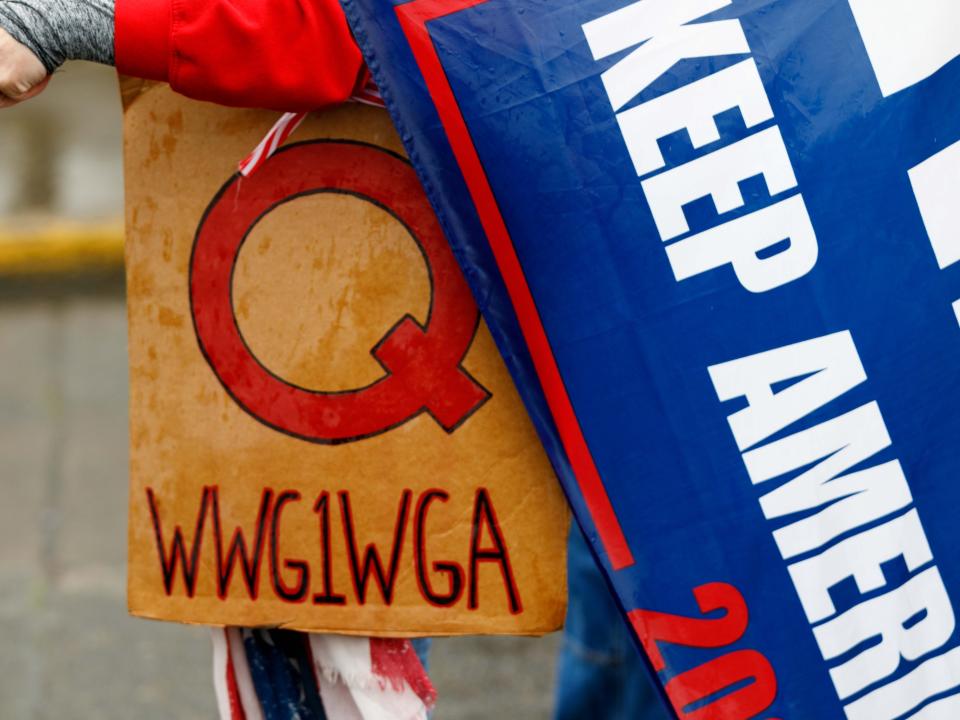
John Rudoff/Anadolu Agency via Getty Images
"Liberation is a very evocative and important term from [the far-right] perspective," Simi said. "They see themselves as a liberation movement that's all about liberty and justice they're being denied and being victimized. President Trump has consistently since his candidacy spoken the language of far-right extremists and white supremacy in particular."
He added that extremists groups are using familiar tactics in their fight against lockdown orders — such as de-legitimizing science and the news media.
"They are the groups that already spreading conspiracy theories, spreading disinformation, and spreading misinformation," Miller said, echoing Simi's remarks. "They already fit into that ecosystem quite well."
Read the original article on Business Insider

